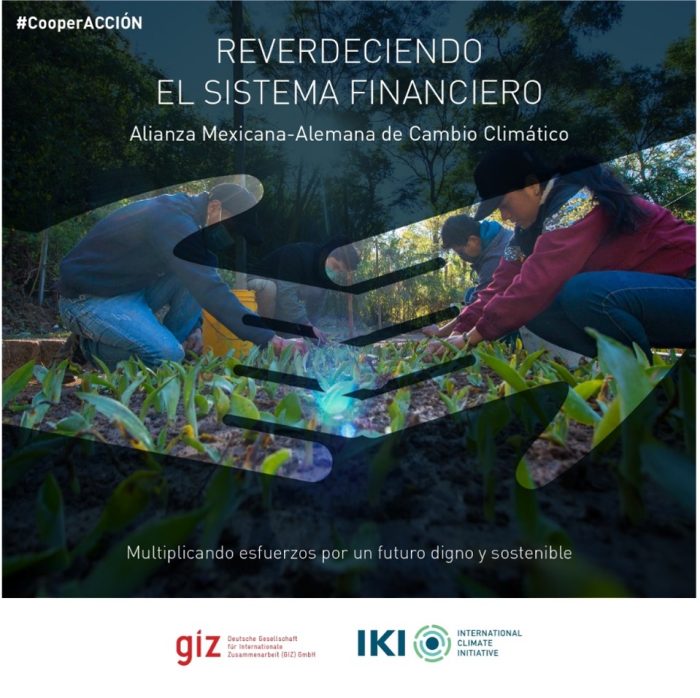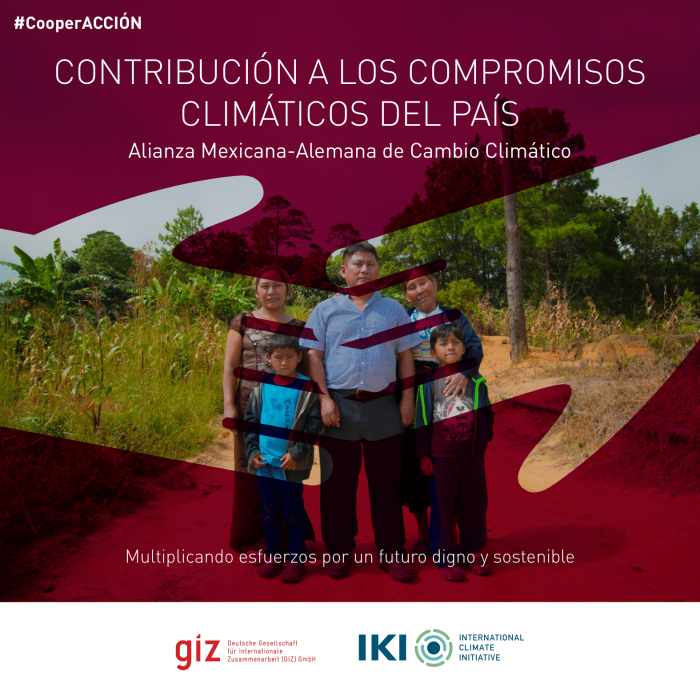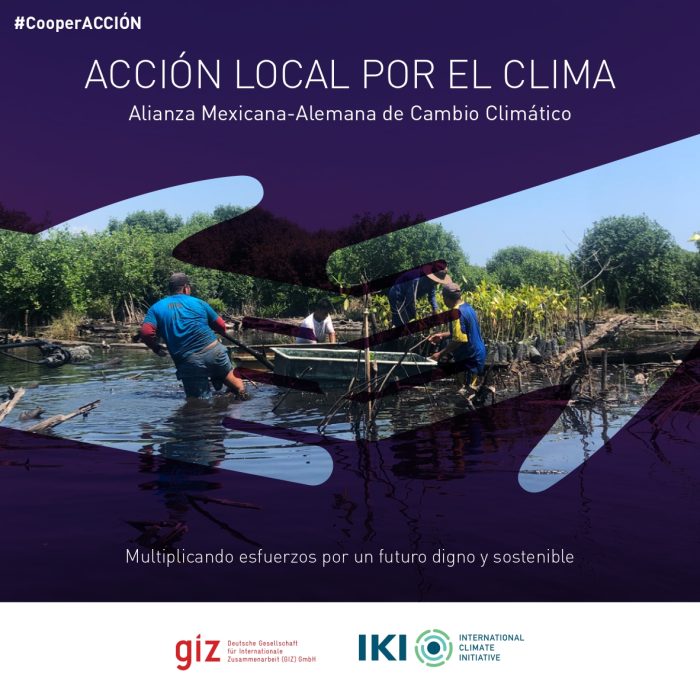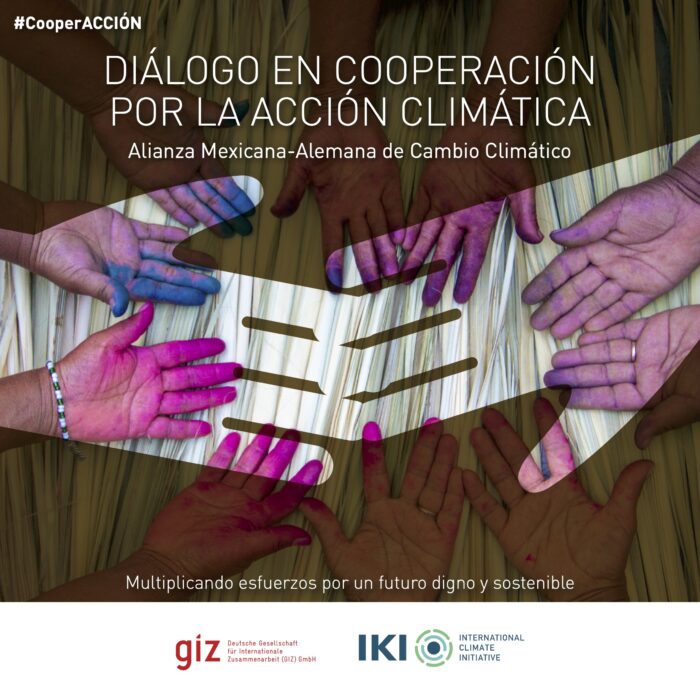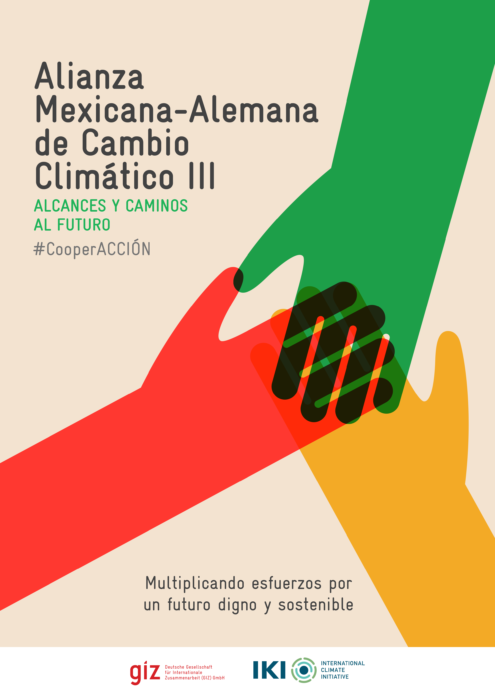Mexican-German Climate Change Alliance
Multiplying Efforts for a Dignified and Sustainable Future
Baseline Scenario
With the 2018 reform of the General Law on Climate Change, Mexico has incorporated its Nationally Determined Contributions (NDCs) under the Paris Agreement into legislation. In addition, the country declared its willingness on the international stage to reduce greenhouse gas emissions by 22% (or 36% with international support) by 2030 compared to a scenario without mitigation measures (Business as Usual – BAU – scenario). Adaptation to climate change is another area where Mexico is pursuing ambitious targets, which have been defined in 21 concrete actions. The country wants to put an end to deforestation, i.e., the (illegal) conversion of forest areas to other land uses. It aims to reduce the number of cities and communities that are particularly vulnerable to the effects of climate change by at least half. Early warning systems are also planned at the national level.
However, efficient management, planning and monitoring tools are lacking. The country also needs strong climate finance tools and methods. Human and financial resources are limited, especially in various regions of the country. Moreover, there is a need to move successfully from planning to implementation.
Objective
The Mexican-German Climate Change Alliance, together with the Government of Mexico, supports the implementation of the Nationally Determined Contribution (NDC) through concrete actions to improve climate change adaptation, local resilience and reduce greenhouse gas (GHG) emissions, leaving no one behind.
Process
The project supports the Mexican Ministry of Environment and Natural Resources (SEMARNAT) to develop short- and long-term planning tools and to build a transparency system to continuously monitor and improve the achievement of NDC targets. In addition, the project promotes innovative financing mechanisms for concrete measures, including innovations from the private sector.
Together with the Mexican government and the Mexican states, the project supports and promotes the strengthening of the competencies of the bodies and institutions involved in the climate agenda so that they can better implement and monitor their contributions at both the federal and subnational levels. It also fosters Mexican-German and international exchanges for implementing climate commitments through the systematisation of lessons learned, the exchange of experiences, and a sustainable and climate friendly consumption and production approach, including innovations from the private sector. On the other hand, it works closely with Mexican financial and banking sectors for the greening of a climate finance system that can serve as a driver for climate action in the country. Finally, the project supports regular exchange and knowledge management between all projects of the International Climate Protection Initiative (IKI) in Mexico.
Areas of work
The Climate Alliance works in four areas to strengthen climate action in Mexico:
Greening the financial system
In order to mobilise resources for the public and private sectors for the implementation of Mexico’s climate goals and the creation of transparent and sustainable financial regulatory frameworks, the Mexican-German Climate Change Alliance project works with the Ministry of Finance and Public Credit (SHCP), the Bank of Mexico (Banxico), the Ministry of Environment and Natural Resources (SEMARNAT) and the private sector, with support from business and financial associations, to develop actions to implement climate change goals in the financial sphere.
By strengthening the social economy, the Alliance helped mobilise private financing and technical assistance for nine socio-environmental projects in various states of the country that address and positively impact climate change adaptation. It also collaborated with the Ministry of Finance and the private sector in the development of two processes focused on strengthening metrics and identifying the framework for green assets of a sustainable taxonomy. On the other hand, it supported the consolidation of the Working Group on Climate-related Financial Disclosures (TCFD Mexico) through training workshops with the private and financial sector, as well as supporting and communicating the launch of the TCFD Mexico Consortium. In addition, it aims to support the mobilisation of resources for the public and private sector to meet Mexico’s climate goals, thus helping to converge the climate and finance sectors from a local perspective.
To learn more about what the Alliance is doing to green the financial system, click on the following image (spanish):
Contributing to the Country’s Climate Commitments
The Alliance cooperates with the Mexican government to ensure that the country has concrete measures at federal and subnational levels to achieve national climate goals by supporting planning processes consistent with climate change policies and creating a framework for transparency; strengthening the capacities of actors in the implementation of goals; developing and strengthening financial planning instruments; and promoting international dialogue.
Therefore, together with federal and subnational actors, the Alliance supports the strengthening of Mexico’s climate goals, with special emphasis on the adaptation component. To achieve increased ambition, support was provided to identify adaptation measures and economic valuation tools. In addition, participatory consultations and capacity building were carried out. Finally, the Alliance supported SEMARNAT in including a human rights and gender perspective in its climate commitments.
To learn more about what the Alliance is contributing to the climate goals, click on the following image (spanish):
Local Climate Action
Climate action at the local level is the spearhead for implementing Mexico’s climate goals, which is why the Mexican-German Climate Change Alliance works hand in hand with the Government of Mexico and subnational governments to strengthen, develop and improve the implementation of actions to meet the country’s adaptation and mitigation commitments.
For example, together with SEMARNAT we built the Climate Action Monitoring System at the Subnational Level to report both mitigation and adaptation actions; we supported Mexico City in including the adaptation component in the Local Climate Action Strategy and Programme; we also worked together with the states of the Yucatan Peninsula to harmonise climate change and forestry legislation. In addition, together with Sinaloa, we implemented a Blue Carbon programme in the municipality of Angostura.
Additionally, together with the United Nations Development Programme (UNDP), we developed the mobile application, RAECO, as a tool to facilitate and create an electronic waste recycling culture among citizens.
To learn more about what the Alliance is doing for local climate action, click on the following image (spanish):
Dialogue in Cooperation
The Mexican-German Climate Change Alliance supports the interconnection of the projects of the International Climate Protection Initiative (IKI) portfolio in Mexico. It supports 32 projects from 21 implementing organisations and promotes the exchange and communication of the IKI project network through the IKI Alliance Mexico knowledge page and a quarterly newsletter on key cooperation topics, as well as annual exchange workshops between IKI projects and high-level policy dialogue forums between Mexico and Germany.
To learn more about what the dialogue in cooperation, click on the following image (spanish):
Learn about some of the work that the Mexican-German Climate Change Alliance and the Ministry of Environment and Natural Resources have carried out in recent years (spanish):

